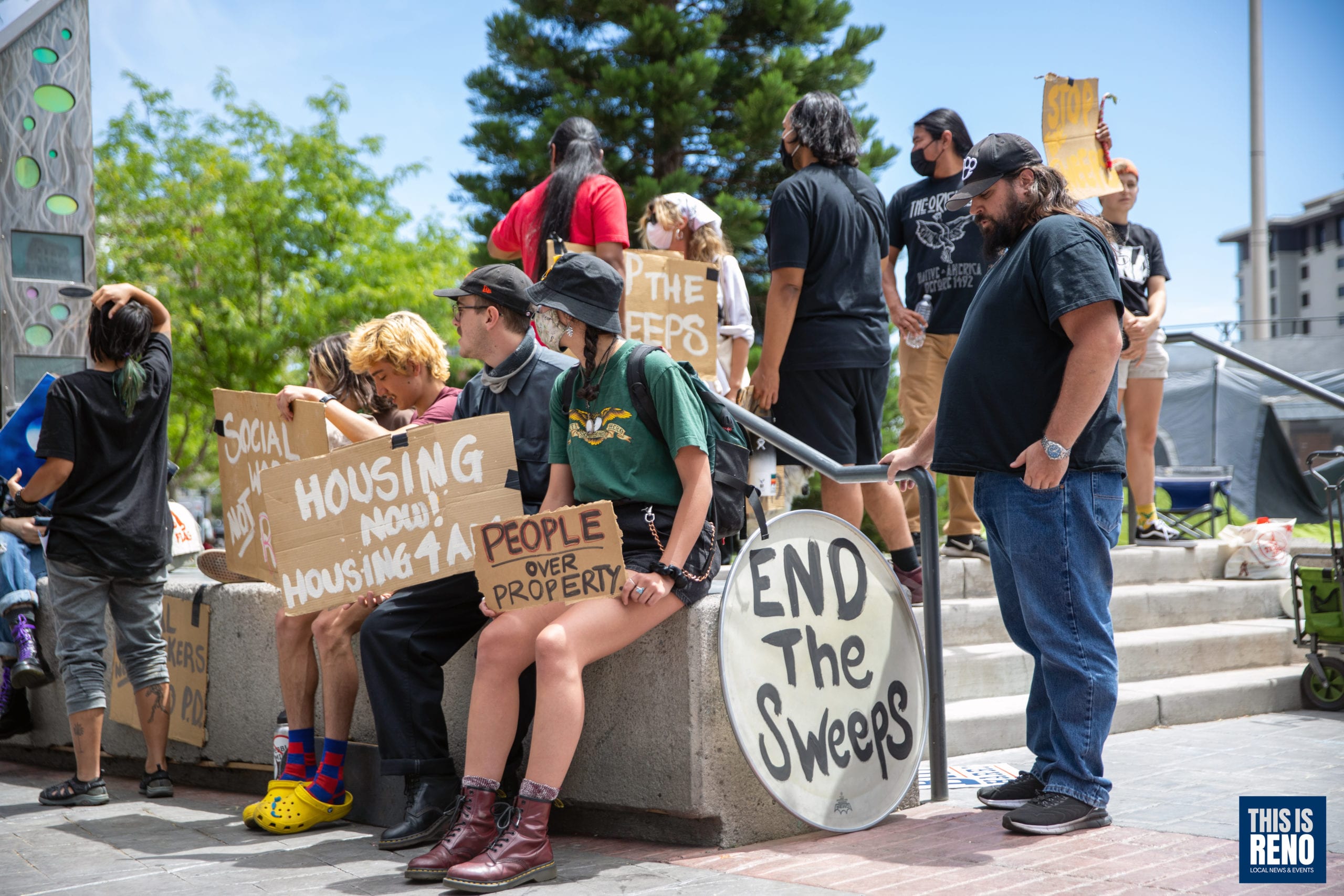Submitted by Jake Maynard

Back in June of this year, activists and advocates set up an occupation-style protest at City Plaza in downtown Reno with one main goal: stop the sweeps.
“Sweeps” are forceful—often violent—displacements of the homeless, or the destruction of their encampments. June’s protest was a direct response to these sweeps and grew as many different individuals and groups joined or assisted.
During the protest we provided food, water, shade, medical attention, clothes and hygiene products. As the protest progressed, many of the unhoused came to recognize the area as a safe place. The days and nights were filled with conversations and interactions between advocates, unhoused folks and all types of people who were curious about the protest.
The divide between the unhoused folks and the downtown community began to close through these interactions.
As an advocate participating in the protest, I learned much about the lived experiences and complex stories behind the people who get lumped into the broad and usually pejorative category “homeless.” A strong sense of community formed as the protest grew and more people took note.
My conversations with the unhoused revealed how traumatizing and harmful the sweeps are. People told us about friends who had gone missing, about having everything they own being thrown into a dumpster or destroyed under a bulldozer, or spending a night at the Washoe County jail after a sweep. The brutality of these sweeps became increasingly obvious, and therefore, so did our need to push to end them.
After a few days of protest, the protestors and unhoused people were swept from the plaza. The large police presence throughout the protest seemed to disproportionately target the houseless. For example, some of our group witnessed RPD officers on bikes ticket unhoused people for sitting along Virginia Street. One of those who was ticketed was in a motorized wheelchair. We witnessed many unhoused people get cited for open containers while standing next to visibly drunk tourists with beers in their hands.
Throughout the protest, there were discussions with stakeholders, including the unhoused, for solutions and plans for the future regarding the housing crisis the city is facing. One of the repeated requests from the protesters was to meet with city officials behind the sweeps.
Eventually, Mayor Hillary Schieve agreed to a meeting with a select group of advocates. One of the proposals from the activists was for a “safe camp” to be developed and run by RISE (Reno Initiative for Shelter and Equality). Meanwhile, the protest continued to ensure that officials kept their promise.
On June 8 at 4:40 am, officers returned to the protest area, singled out and cited four protesters for being in the park after hours, despite there being many other people present in the park at that time. These four are fighting the citations claiming that their First Amendment rights to protest were infringed upon due to the selective nature of the citations.
As Washoe County takes over the northern Nevada regional homeless services, it feels like much of the work between advocates and city officials has been in vain.
Washoe County Commissioner and chair of the Community Homelessness Advisory Board Alexis Hill has stated that she is supportive of these destructive and harmful sweeps that sparked the major protests in the first place. Hill will have a more direct role regarding homelessness services as the city transitions the services to the county.
Meanwhile, sweeps continue to occur.
These traumatic sweeps create instability in unhoused populations, making efforts at transition and assistance more difficult. The many mutual aid groups who serve the unhoused often lose track of people after sweeps. Not only do our friends go missing, but their access to lifesaving outreach work is effectively cut off.
As the temperatures begin to drop, the sweeps will only create more danger and misery. If you destroy someone’s shelter and throw away their blankets (common practice during sweeps) they are at increased risk of hypothermia and exposure. Officials will often say that those swept from camps can always come to the CARES facility. However, for many people, the facility is a worse option than taking a risk on the streets.
In an extremely short time frame, RISE provided the city with a budget and a suitable location for the proposed safe camp. When they presented it to city officials, the city kept requiring more and more. It eventually became clear that they were stalling the proposal and had no intention of following through with any kind of meaningful action.
We have tried to work with the city and county countless times, but they continue to ignore our solutions. Despite the obstacles, obfuscations, corruption and dishonesty from the powers-that-be, the unhoused community, activists, mutual aid groups and advocates alike all continue the fight against the sweeps.
Jake Maynard is a local photographer and activist who is involved in mutual aid work and nonprofits.
Submitted opinions do not necessarily reflect the views of This Is Reno. Have something to say? Submit an opinion article or letter to the editor here.


